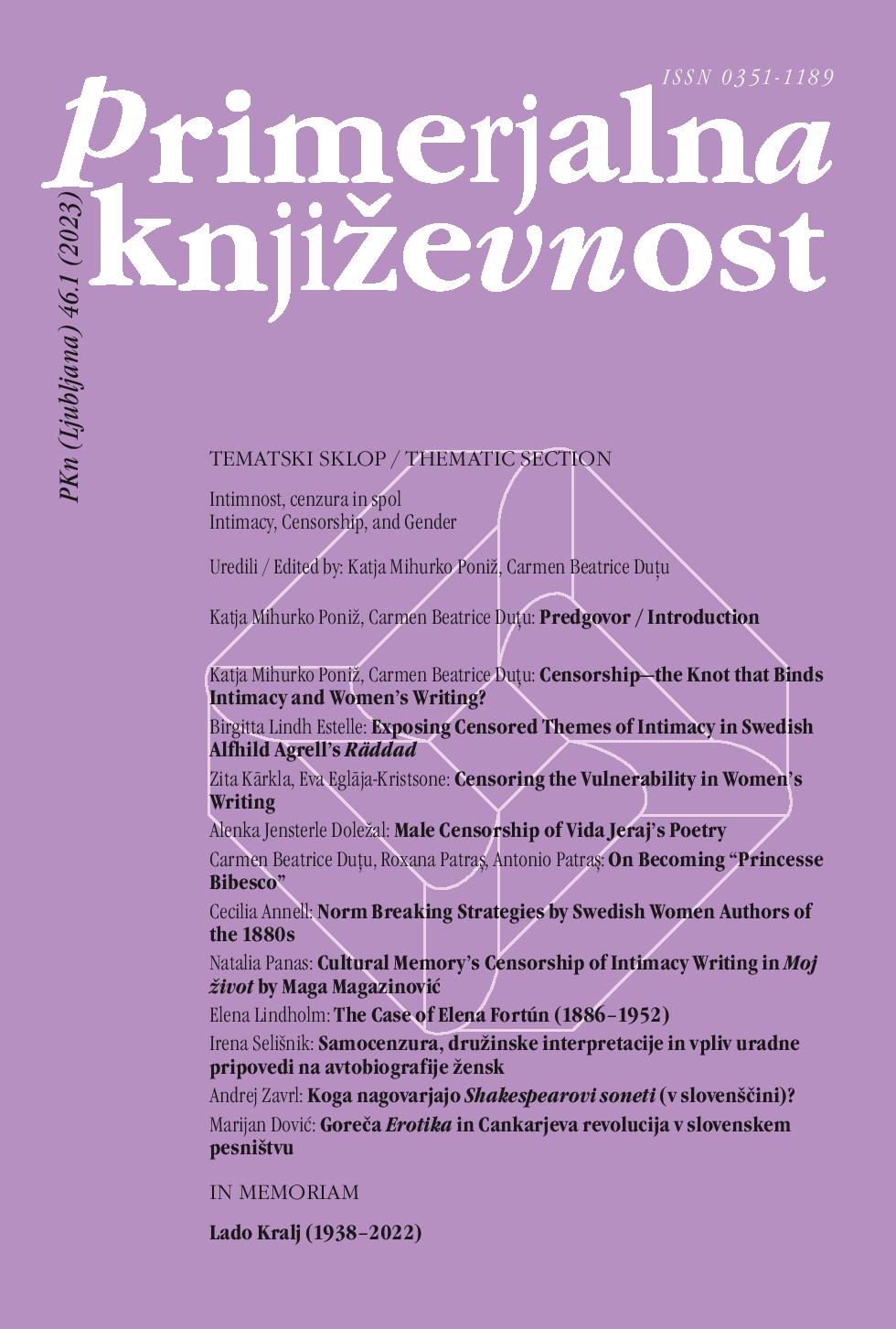Her Story Is Like a Weed: Censoring the Vulnerability in Women’s Writing
DOI:
https://doi.org/10.3986/pkn.v46.i1.03Keywords:
feminist literary criticism, Latvian literature, Latvian women writers, nineteenth century, intimacy, motherhood, censorship, Rūmane-Ķeniņa, AnnaAbstract
The aim of this article is to broaden feminist scholarship on women writers by exploring the relationship between women’s writing, intimacy, vulnerability and censorship, and the rediscovering and canonization of women’s writing in Latvian literary culture. In the early twentieth century, intimacy and motherhood as a source of vulnerability in women’s writing was closely linked to censorship, which revealed enduring patriarchal attitudes. The disclosure of vulnerability associated with a woman’s embodied experience was “a weed” which critics wanted to weed out. Focusing on the example of Anna Rūmane-Ķeniņa (1877–1950), whose literary texts create experimental journeys into intimacy, exploring the inner states of female characters, family relationships and particular situations (death and grief that bring her characters into intimate contact with others and change the shape and experience of intimacies), the article examines the censoring attitude of literary criticism towards the openness with which women’s experiences are discussed.
References
-ks. “No Rīgas.” <em>Mājas Viesis</em> 31 (1902): 5.
Berlant, Lauren. “Intimacy: A Special Issue.” <em>Critical Inquiry</em> 24.2 (1998): 281–288.
Berlant, Lauren. <em>Cruel Optimism</em>. Durham, NC; London: Duke University Press, 2011.
Birkerts, Antons. “Latviešu sieviete plašākā centienu laukā.” <em>Dzimtenes Vēstnesis</em> 79 (1912): 9.
Birkerts, Antons. “Sieviete visjaunākā latviešu rakstniecībā.” <em>Dzimtenes Vēstnesis</em> 177 (1912): 1.
Bunn, Matthew. “Reimagining Repression: New Censorship Theory and After.” <em>History and Theory</em> 54.1 (2015): 25–44.
Butler, Judith. “Rethinking Vulnerability and Resistance.” <em>Vulnerability in Resistance</em>. Eds. J. Butler, Z. Gambetti, and L. Sabsay. Durham, NC; London: Duke University Press, 2016. 12–27.
Coleman, Jenny. “The Disconcerting Double Bind: Anonymity and Writing as a Woman in the Nineteenth Century.” <em>Nineteenth Century Gender Studies</em> 7.1 (2011). Web. http://www.ncgsjournal.com/issue71/coleman.html.
Cooke, Jenifer. “The Risks of Intimate Writing.” <em>Angelaki</em> 16.2. (2011): 3–18.
Cooke, Jenifer. “Making a Scene: Towards an Anatomy of Contemporary Literary Intimacies.” <em>Scenes of Intimacy: Reading, Writing and Theorizing Contemporary Literature</em>. Ed. J. Cooke. London: Bloomsbury, 2013. 3–23.
Daija, Pauls, and Benedikts Kalnačs. <em>A New History of Latvian Literature: The Long Nineteenth Century</em>. Berlin: Peter Lang, 2022.
Druvas redakcija. “Mūsu lasītāji.” <em>Druva</em> 2 (1914): 194–199.
Eagleton, Mary. “Finding a Female Tradition: Introduction.” <em>Feminist Literary Criticism</em>. Ed. Mary Eagleton. London; New York, NY: Routledge, 2014. 1–12.
Freshwater, Helen. “Towards a Redefinition of Censorship.” <em>Censorship & Cultural Regulation in the Modern Age</em>. Ed. B. Muller. Leiden; Boston, MA: Brill, 2004. 217–237.
Gilson, Erinn. “Vulnerability, Ignorance, and Oppression.” <em>Hypatia</em> 26.2 (2011): 308–332.
Goba, Alfrēds. “Latviešu rakstnieces.” <em>Sieviete</em> 12 (1925): 255–256.
Gubar, Susan. “‘The Blank Page’ and the Issues of Female Creativity.” <em>Critical Inquiry</em> 8.2 (1981): 243–263.
Gueslin, Julien. “‘Inventing’ the Latvian Democracy in the Western Europe: Anna Ķeniņa and the Latvian Propaganda in the Swiss and French Democracies in 1917–1918.” <em>Democratic Processes in the Eastern and Central Europe in 1917: Political, Military, Social and Cultural Aspects</em>. Ed. I. Ciganovs. Rīga: Latvijas Kara Muzeja gadagrāmata, 2017. 46–59.
Ikstena, Nora. “Anna Rūmane-Ķeniņa: Dzīves skices.” <em>Pārnākšana: Grāmata par Annu Rūmani-Ķeniņu</em>. Rīga: Garā Pupa, 1996. 9–36.
Kārkla, Zita. “Moving into Modernism: Outward and Introspective Journeys in the Early 20th Century Latvian Women’s Travel Narratives.” <em>Deeds and Days</em> 72 (2020): 105–118.
Kārkla, Zita, and Eva Eglāja-Kristsone. “Liriskās ģeogrāfijas: literārās telpas kartēšana latviešu rakstnieču romānos un īsprozā.” <em>Letonica</em> 47 (2022): 104–128.
Kusiņa, Linda. <em>Sieviešu jautājums un sievietes tēls latviešu rakstniecībā 1870–1920</em>. Rīga: Promocijas darbs, 2013.
Ķeniņš, Tālivaldis. “Atskats uz mātes dzīvi.” <em>Pārnākšana: Grāmata par Annu Rūmani-Ķeniņu</em>. Rīga: Garā Pupa, 1996. 42–57.
Meškova, Sandra. “Constructing a Woman Author within the Literary Canon: Aspazija and Anna Brigadere.” <em>History of the Literary Cultures of East-Central Europe: Junctures and Disjunctures in the 19th and 20th Centuries. Volume 4: Types and Stereotypes</em>. Eds. M. Cornis-Pope and J. Neubauer. Amsterdam: John Benjamins Publishing Company, 2010. 241–251.
Mitchell, Kaye. “Feral with Vulnerability.” <em>Angelaki</em> 23.1 (2018): 194–198.
Moeschlin, Felix. <em>Der Amerika-Johann: ein Bauernroman aus Schweden</em>. Leipzig: Sarasin, 1912.
O’Reilly, Andrea, ed. <em>From Motherhood to Mothering: The Legacy of Adrienne Rich’s Of Woman Born</em>. New York, NY: SUNY Press, 2012.
Rich, Adrienne. <em>Of Woman Born: Motherhood as Experience and Institution</em>. New York, NY: Norton, 1976.
“R.L.B. Zinību Komisijas vasaras sapulces.” <em>Tēvija</em> 75 (1912): 1–2.
Rūmane-Ķeniņa, Anna. “Par sevi.” <em>Sieviete latvju rakstniecībā</em>. Jelgava: Jānis Ķelpe, 1936. 58–65.
Rūmane-Ķeniņa, Anna. “Naktsjūtas.” <em>Austrums</em> 1 (1903): 47–48.
Rūmane-Ķeniņa, Anna. “Melnais ērglis.” <em>Zalktis</em> 4 (1908): 50–88.
Rūmane-Ķeniņa, Anna. “Par meiteņu audzināšanu.” <em>Pēterburgas Avīzes</em> 74 (1903): 1.
Rūmane-Ķeniņa, Anna. “Manas dzīves gaitas hronoloģiskā secībā.” LU AB MR K. Egles fonds nr. 269.
Rūmane-Ķeniņa, Anna. “Vēstule Teodoram Zeifertam.” LU AB MR K. Egles fonds nr. 543, 49.
Rūmane-Ķeniņa, Anna. “Mother’s Sorrow.” Transl. M. Rozītis. <em>Baltic Belles: The Dedalus Book of Latvian Women’s Literature</em>. Ed. E. Eglāja-Kristsone. Sawtry: Dedalus, 2022. 20–70.
Rye, Gill et al., eds. <em>Motherhood in Literature and Culture: Interdisciplinary Perspectives from Europe</em>. London; New York, NY: Taylor & Francis, 2017.
Upīts, Andrejs. “Annas un Ata Ķeniņu ražojumi.” <em>Vārds</em> 1 (1912): 407–409.
Upīts, Andrejs. “Mūsu jaunās rakstnieces.” <em>Domas</em> 6 (1913): 659–672.
Upīts, Andrejs. “Sieviešu literatūra.” <em>Latviešu jaunākās rakstniecības vēsture</em>. Rīga: D. Zeltiņa, A. Golta apgāds, 1921. 360–372.
Upīts, Andrejs. “Latviešu literatūra.” <em>Domas</em> 7 (1927): 144–149.
Woolf, Virginia. <em>A Room of One’s Own</em>. London: Penguin Books, 2000.


